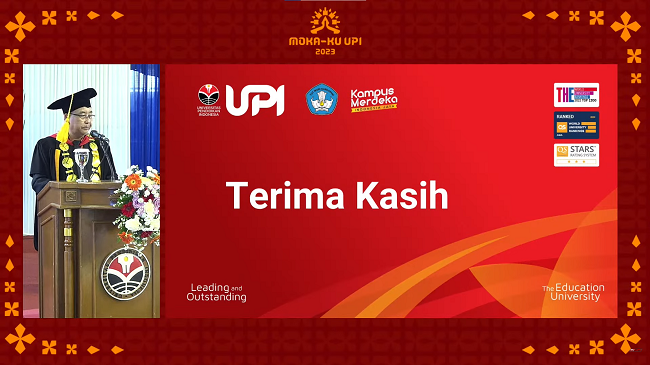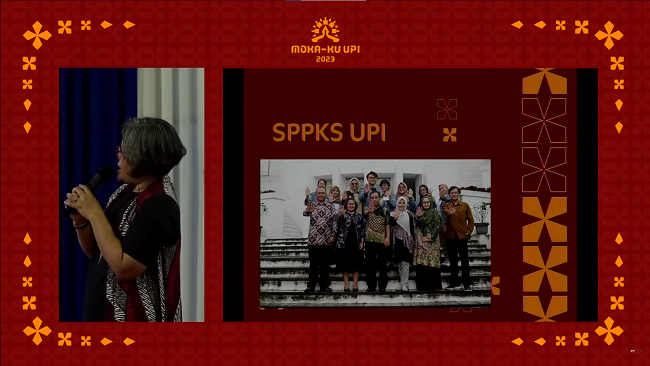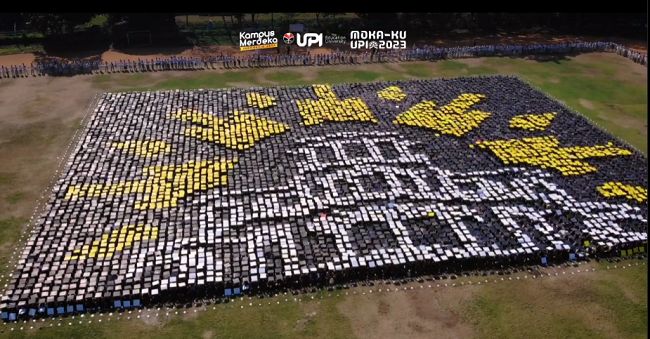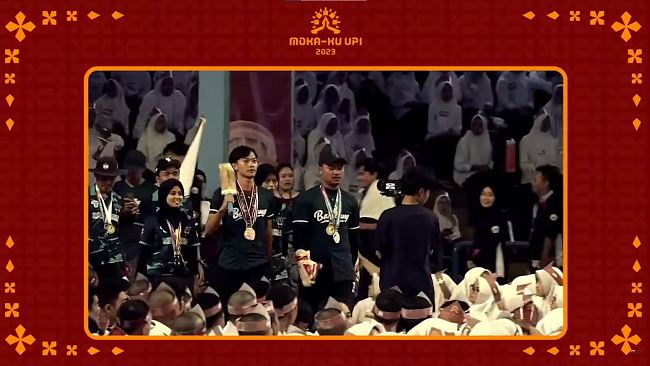Masa Orientasi Kampus dan Kuliah (MOKAKU) is an annual event organized by the Universitas Pendidikan Indonesia (UPI) to welcome new students who have successfully passed the SNBP, SNBT, and SM UPI selection processes, enabling them to continue their studies at the Universitas Pendidikan Indonesia. This year, MOKAKU UPI took place over 4 days from August 28th to 31st, with the theme “Campus Education Prakarya as the Manifestation of National Character.” The aim is to mold new students into excellent human resources with strong educational values and to encourage them to contribute their creativity to the development of education in Indonesia.
According to ISOLAPOS.com, the Universitas Pendidikan Indonesia welcomed 12,896 new students from various academic levels, including D4/Vocational, Bachelor’s (S1), Master’s (S2), and Doctoral (S3) programs, representing different faculties within UPI. This year marked the first time MOKAKU was held offline again after the pandemic. The event was not limited to the Bumi Siliwangi Campus but was also conducted simultaneously across UPI’s regional campuses, including Tasikmalaya, Cibiru, Purwakarta, Sumedang, and Serang.

Figure 1. Greetings from UPI Rector Prof. Dr. H. M. Solehuddin, M.Pd.
At the UPI Bumi Siliwangi Campus, new students were divided into six different sectors, namely Bhaskara Anuva, Bhaskara Sheela, Bhaskara Ariendra, Bhaskara Vinaya, Bhaskara Nayaka, and Bhaskara Diratama. They gathered at the UPI Gymnasium on the first day of the MOKAKU event, where they received guidance and orientation on the Role and Function of Students. Later, they were briefed by the Sexual Violence, Bullying, and Narcotics Handling Unit (SPPKS UPI) about Strategies, Challenges, and Social Impacts. There was also a presentation about the UPI System and Achieving Students in the form of a talk show, along with a performance by KABUMI UPI.

Figure 2. Presentation by SPPKS UPI
On the second day, there was an agenda called MOKAKU Faculty, where new students were introduced to their respective faculties. New students received information about their faculty’s profile, including academic structure, academic and student guidance, as well as facilities available within their faculty. In FPMIPA, the new students were then equipped with the MOKAKU Department, which involved an introduction to the study programs within FPMIPA. This ensured that new students would be well-informed about the profiles of the study programs they would be studying in. This activity was conducted by all study programs, including the Computer Science and Computer Science Education programs.
Figure 3. Greetings and Presentation by Prof. Lala Septem Riza, M.T. during Faculty MOKAKU
The Computer Science Education and Computer Science study programs collaborated with the Student Executive Board of KEMAKOM to provide an introduction to new students from both study programs. They were given information about the profiles of the Computer Science Education and Computer Science study programs, scholarships available, career prospects after completing their studies, and other motivations aimed at inspiring new students to navigate their academic journey. Additionally, new students from the Computer Science Education and Computer Science study programs were introduced to student organizations within these study programs, such as the Student Executive Board of KEMAKOM and the Student Representative Council of KEMAKOM.
Figure 4. Introduction of the KEMAKOM Student Executive Board during Faculty MOKAKU
Moving on to the third day of MOKAKU, new students have gathered once again at the UPI Gymnasium to receive guidance and materials on Time Management and Digital Library Literacy from the University of Pendidikan Indonesia’s Guidance and Counseling and Career Development Board. They also received instruction on National Defense and Nationhood Development in the Contemporary Era, with a focus on Anti-Corruption Awareness for a Healthy Campus: Challenges and Hopes.
In addition to the guidance and materials, on the third day of MOKAKU, the new UPI students were assembled at the Lapang Berdebu, Universitas Pendidikan Indonesia, to participate in a Mozaik activity with 16 formations prepared by the organizing committee, including one that formed the shape of the Isola Building at the University of Pendidikan Indonesia. Despite the scorching sun, the new students exhibited high enthusiasm for this activity, as evidenced by the beautiful and captivating results.

Figure 5. One of the formations from the Mozaik activity conducted on the fourth day of MOKAKU
Then, on the fourth day of MOKAKU, new students were provided with guidance and materials at the UPI Gymnasium regarding Ethics in Social Media and Financial Literacy to instill an Anti-Corruption Character in students, aiming to develop excellent human resources. Additionally, there were presentations and introductions in the form of a parade conducted by each Student Activity Unit (UKM) and Student Organization at the Universitas Pendidikan Indonesia. The purpose of this activity was to introduce the student units and organizations at UPI and encourage new students to channel and hone their hobbies and abilities by participating in the activities offered by these UKMs and Organizations. The fourth-day activities concluded with a performance by guest stars who added excitement to the MOKAKU event, along with the screening of the results of the Mozaik activity that took place on the third day.

Figure 6. Parade Introduction of UPI Student Activity Units (UKM) to New Students
In general, MOKAKU UPI aims to introduce the Universitas Pendidikan Indonesia to the new gems of Indonesian education. MOKAKU also aligns with the policies of the Ministry of Education, Culture, Research, and Technology regarding the introduction of campus life for new students (PKKMB). Its purpose is to provide new students with guidance so that they can adapt more quickly to the campus environment and the higher education system.
Hopefully, through these activities, new students, especially those from the Computer Science Education and Computer Science programs, can become more acquainted with the cultures present at the Universitas Pendidikan Indonesia and inspire them to sharpen their skills and take greater pride in their alma mater.
Writers: M. Cahya